GREER FAY CASHMAN
Antisemites have found the Internet to be an effective way of spreading their hate to an unimaginable number of people, according to World Jewish Congress CEO Robert Singer.
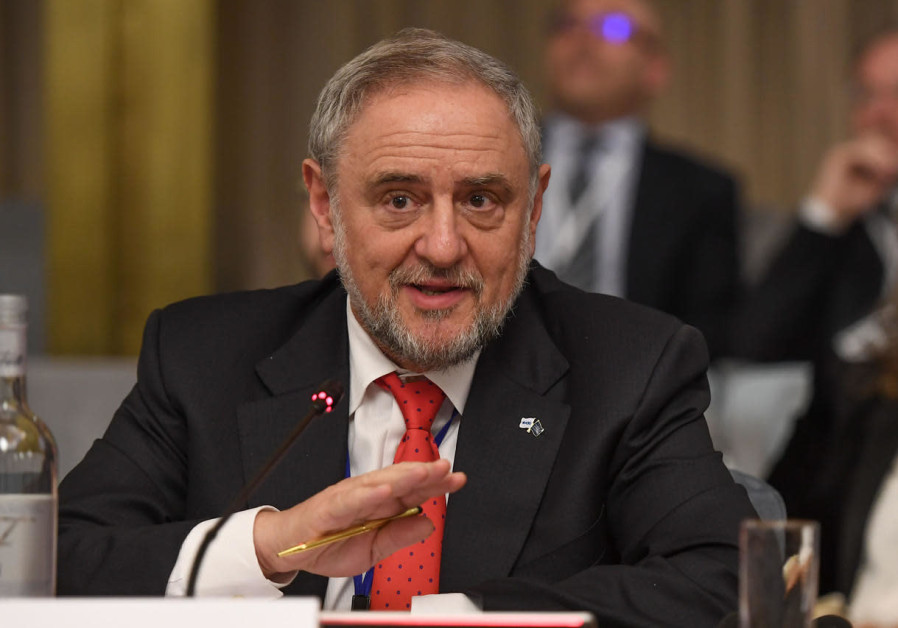 WJC CEO Robert Singer speaking at the International Conference on Antisemitism in Rome on January 29, 2018.. (photo credit: SHAHAR AZRAN)
WJC CEO Robert Singer speaking at the International Conference on Antisemitism in Rome on January 29, 2018.. (photo credit: SHAHAR AZRAN)
World Jewish Congress CEO and executive vice president Robert Singer addressed the Conference on Combating Antisemitism in the OSCE Region in Slovakia, which this week brought together political leaders, government representatives, stakeholders in academia, civil society organizations and the media.
Singer related to the survey released late last year by the European Union’s Fundamental Rights Agency (FRA) that indicated a high sentiment among Jews of feeling targeted by hate. Noting that “extremists on both the far Left and the far Right, antisemites and other lowlifes find common ground when it comes to hatred of Jews,” Singer said: “On the far Right, extremist parties have entered the mainstream, exploiting and manipulating Holocaust memory and glorifying Nazis as part of a nationalist agenda, denying their own antisemitism by claiming to be pro-Israel. On the far Left, disagreement with Israeli government policies has morphed into a disturbing anti-Zionism that seeks to deny the Jewish people the right to a state of their own, and to delegitimize Israel’s very existence. Antisemitism is no longer the extreme. It is mainstream.”
Antisemites have found the Internet to be an effective way of spreading their hate to an unimaginable number of people, Singer continued, noting that this serious threat pales in comparison to the threat Jewish communities around the world face to their physical security – in Bulgaria, Belgium, Denmark and the United States, to name just a few recent examples.
“We must find new ways to reach young people, whatever their nationality or religion, so they will be able to learn the lessons of history’s greatest tragedy,” Singer said, pointing to further statistics released last month by the Holocaust Memorial Day Trust, which found that one in 20 Britons do not believe that the Holocaust happened, and that 12% think the scale of the genocide has been inflated.
■ SADLY, HOLOCAUST survivors are decreasing in number month by month. Relatives who are disposing of the estates of Holocaust survivors do not always realize the value of things they leave behind, such as yellowed newspaper clippings in foreign languages. Yet such clippings may have great historic value. The situation is even more troubling when a deceased survivor has no relatives, and a stranger simply gets rid of the junk that the deceased left behind. It would be wise, each time a Holocaust survivor dies, to consult with Yad Vashem, in case something of historic value has been left behind.
Yad Vashem’s “Gathering the Fragments” campaign to collect Holocaust-era artifacts for purposes of preserving and sharing them in various ways, is one way to perpetuate Holocaust memory.
Among recent donations to the campaign was a set of baby clothes made for and worn by Abe Reinhold during the Holocaust. In addition to his baby clothes, Reinhold included a series of letters written by a Dutch woman who had hidden him and cared for him during the Holocaust.
Reinhold was born in 1942 to Mosche and Fanny Reinhold, German Jews who, after Kristallnacht in 1939, fled to the Netherlands and joined a Zionist training program of the Halutz (Pioneer) movement.
In 1942, as Fanny was about to give birth, she was transferred to a hospital in Deventer near the Zionist training camp. In April 1943, Mosche and Fanny went into hiding, assisted by a Dutchman named Piet Wildschut.
Their eight-month-old son, Arie, was transferred with the help of members of the Westerweil underground to the care of Thea Klein-Stopper, who raised him until the end of the war. On occasion, Thea brought the baby to the Wildschut house where his parents could see him.
As the risk of raids and deportations increased, Mosche and Fanny Reinhold hid with the assistance of Wildschut in the area of an abandoned brick factory. During the day, the couple hid on the cover of the air system in the chimney, and at night they left the hiding place. During this time, Mosche and Fanny would spin wool for the underground. Whenever possible, they would send some wool to Thea so she could knit clothes for their baby.
In 1964, Yad Vashem recognized Piet Wildschut as one of the Righteous Among the Nations.
The Reinholds were doubly fortunate, not only in surviving, but in having their infant son returned to them. There were many cases in which Christian women developed such a strong affection for the Jewish babies put in their care that they were reluctant to give them back to their biological parents after the war. There were other cases in which the biological parents did not survive and the Jewish babies grew up as members of Christian families, were baptized. In some cases, Jews even entered the priesthood or became nuns, not knowing their true origins, which were sometimes revealed to them on the deathbed of the adoptive parent. There are such people living in Israel today who are torn between the religion in which they were raised and the one into which they were born.
As traumatic as that may be, it is always traumatic for Yad Vashem historians to learn that historic documents, photographs, newspaper clippings and objects salvaged from concentration or death camps by a recently deceased Holocaust survivor, have been discarded by whoever disposed of that person’s property.
Dr. Haim Gertner, director of Yad Vashem’s Archives Division, and Fred Hillman, chair for Holocaust documentation, stress the importance of transferring these fragments of history to Yad Vashem.
Sometimes a single object helps the viewer to better comprehend the enormity of what was lost.
■ EVEN IN the darkest of days, there are points of light. The growing number of antisemitic incidents around the world and in Europe, in particular, have to some extent brought Jewish communities closer together. But more than that they have prompted decent non-Jews to work individually and collectively against all forms of racism and xenophobia, and to do more in their countries to preserve and/or restore Jewish community property damaged by the Nazis or the Communists who came afterward.
Bar-Ilan University, in the framework of an Erasmus Mobility Agreement with Macedonia, has become active in a large-scale project to restore Macedonia’s ancient Jewish cemetery of Bitola, the largest and oldest in the Balkans. Dr. Rachel Levy-Drummer, Prof. Irit Amit, of the Department of Geography and Environment, Prof. Shmuel Refael, director of the Naime and Yehoshua Salti Institute for Ladino Studies, and Dr. Ilia Rodov, chairman of the Department of Jewish Art, are participating in this effort together with researchers from UKLO University in Bitola. Led by Israeli Ambassador to Macedonia Dan Oryan, the project is particularly significant given that Macedonia was home to the most ancient Balkan Sephardi community, 98% of which was annihilated at Treblinka. Out of a community of some 7,400 people, barely 150 survived. Cooperation in this realm is currently being expanded with the support of Prof. Yaron Harel, dean of the Faculty of Jewish Studies, and Prof. Judy Baumel-Schwartz, director of the Arnold and Leona Finkler Institute for Holocaust Research.
“The Israeli Ministry of Foreign Affairs views this project as particularly important in the preservation and commemoration of a Balkan Sephardi community that was almost completely destroyed during the Holocaust,” said Oryan. “We see academic cooperation between Israel and Macedonia as a significant step toward strengthening relations between our countries. Bar-Ilan University’s role in the special ties that we are building with Macedonia is very significant, both in the classical disciplines of academia, and in the unique partnership in advancing the effort to tell the story of the Jewish people in general, and in particular the legacy of the Macedonian Jewish community and the tragedy it endured during the Holocaust.”
BIU has also signed new cooperation agreements in Skopje with UKIM University, Macedonia’s largest university, with the participation of Minister of Health Dr. Venko Filipce and Minister of Education Dr. Arber Ademi.
The agreements, which will establish cooperation between the faculties of medicine and the faculties of humanities and social sciences, were signed by Prof. Karl Skorecki, dean of the Azrieli Faculty of Medicine at BIU, the university’s deputy president Prof. Moshe Lewenstein, and UKIM University rector Prof. Nikola Jankulovski. Cooperation between the Azrieli Faculty and UKIM University was initiated by former Azrieli Faculty dean Prof. Ran Tur-Kaspa, and is now being led by BIU academic secretary Levy-Drummer.
An additional agreement, expected to be signed between BIU and the Macedonian ministries of Health and Innovation, will offer Macedonian physicians a course in clinical bio-informatics. The course will be taught by Levy-Drummer, who specializes in biostatistics and computational biology, and Prof. Ron Unger, director of the Computational Biology Program. The agreement will bring Macedonia one step closer toward breaking into the field of personalized medicine, in which medical decisions, practices, interventions and more are tailored to individual patients. This innovative field does not yet exist in Macedonia.
BIU’s Smart Cities Impact Center, headed by Dr. Eyal Yaniv, director of the School of Business Administration, also has an academic collaboration with Macedonia. As part of Bar-Ilan’s ongoing joint academic activities, a hackathon on the legacy of Macedonian Jewry was held last year.
In the near future Prof. Uri Polat, director of Bar-Ilan’s School of Optometry and Vision Science, will head a delegation of researchers and alumni to Macedonia, where they will perform wide-ranging eye examinations on young children who, without proper diagnosis and treatment, may eventually suffer from learning and social problems.
 Arabowie są winni Żydom dużo więcej niż 250 miliardów dolarów
Arabowie są winni Żydom dużo więcej niż 250 miliardów dolarów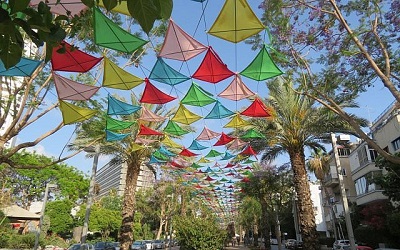 Bulwar Ben Guriona w maju 2018, jedno z moich najcenniejszych wspomnień z Tel Awiwu
Bulwar Ben Guriona w maju 2018, jedno z moich najcenniejszych wspomnień z Tel Awiwu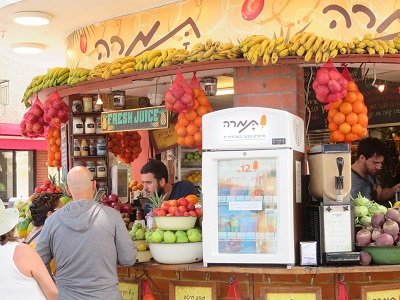 Handlarz owocami na Bulwarze Ben Guriona w Tel Awiwie
Handlarz owocami na Bulwarze Ben Guriona w Tel Awiwie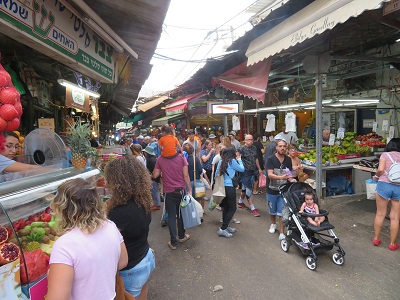 Na targu w Tel Awiwie
Na targu w Tel Awiwie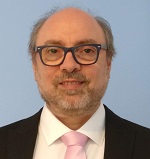 Fred Maroun – Pochodzący z Libanu Kanadyjczyk. Wyemigrował do Kanady w 1984 roku, po 10 latach wojny domowej. Jest działaczem na rzecz liberalizacji społeczeństw Bliskiego Wschodu. Prowadzi stronę internetową fredmaroun.blogspot.com
Fred Maroun – Pochodzący z Libanu Kanadyjczyk. Wyemigrował do Kanady w 1984 roku, po 10 latach wojny domowej. Jest działaczem na rzecz liberalizacji społeczeństw Bliskiego Wschodu. Prowadzi stronę internetową fredmaroun.blogspot.com


